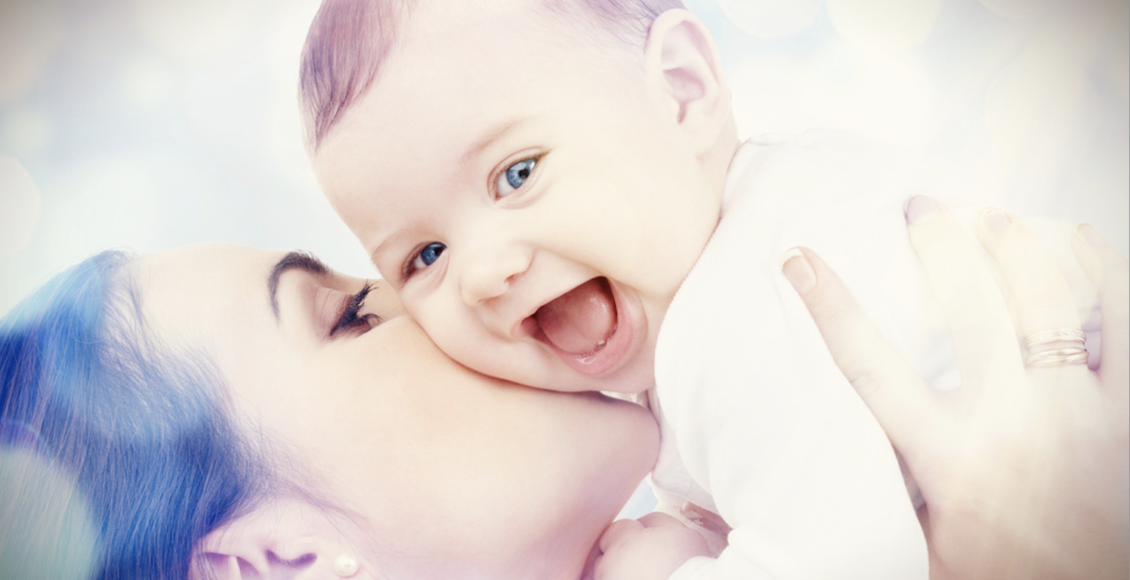Normalizing Nurturing: A Discussion with the Authors of Attached at the Heart
Lisa Reagan talks with Lysa Parker and Barbara Nicholson about their new edition of Attached at the Heart.
“Applying the wisdom in this book is nothing short of revolutionary
for the fulfillment of our birthright of connection and a sense of belonging.” ~ Alanis Morissette
About the Interview
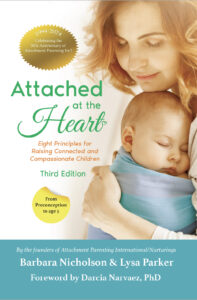 Lisa Reagan talks with Lysa Parker and Barbara Nicholson, founders of Attachment Parenting International, about the new edition of their beloved and classic parenting book, Attached at the Heart: Eight Principles for Raising Connected and Compassionate Children.
Lisa Reagan talks with Lysa Parker and Barbara Nicholson, founders of Attachment Parenting International, about the new edition of their beloved and classic parenting book, Attached at the Heart: Eight Principles for Raising Connected and Compassionate Children.
About Attached at the Heart
Parents and caregivers will soon have an updated version of a treasured and revolutionary resource to guide them through life with their newborn through age five child. Attached at the Heart by Barbara Nicholson and Lysa Parker, considered the unofficial guide to attachment caregiving, will be re-released in January 2024 with important updates for our modern age.
Read the foreword by Darcia Narvaez to Attached at the Heart on Kindred here.
Read an overview of the book, the eight principles of attachment parenting, and the new information in the book here.
About the Authors
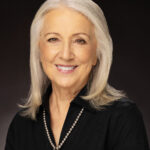 Barbara Nicholson received a master’s degree in education from Stephen F. Austin State University and a bachelor’s degree in education from University of North Texas, with Learning Disabilities certification from Texas Woman’s University. Professionally, she taught children with learning disabilities and was a La Leche League International breastfeeding support group facilitator for over twenty-five years. She is a Certified Educator of Infant Massage through Infant Massage USA.
Barbara Nicholson received a master’s degree in education from Stephen F. Austin State University and a bachelor’s degree in education from University of North Texas, with Learning Disabilities certification from Texas Woman’s University. Professionally, she taught children with learning disabilities and was a La Leche League International breastfeeding support group facilitator for over twenty-five years. She is a Certified Educator of Infant Massage through Infant Massage USA.
In 1994, Barbara cofounded Attachment Parenting International (API), also known as Nurturings.org, a nonprofit parent education organization. She is the co-author of the book Attached at the Heart, Eight Parenting Principles for Raising Connected and Compassionate Children, currently in publication for the 3rd Edition. She is a trainer for the online Attached at the Heart Parenting Program which she developed with co-author, Lysa Parker.
She is the mother of four grown sons and lives with her husband in Nashville, Tennessee.
 Lysa (Lisa) Parker received both her bachelor’s in education and her master’s degree in Human Environmental Sciences specializing in Human Development and Family Studies. She earned her designation of Certified Family Life Educator (CFLE) from the National Council on Family Relations in 2004 and was the 2014 president for the Southeast Council on Family Relations. Lysa is also a Certified Educator of Infant Massage (CEIM). In 1994, she co founded Attachment Parenting International (API), now known as Nurturings, a nonprofit parent education & support organization.
Lysa (Lisa) Parker received both her bachelor’s in education and her master’s degree in Human Environmental Sciences specializing in Human Development and Family Studies. She earned her designation of Certified Family Life Educator (CFLE) from the National Council on Family Relations in 2004 and was the 2014 president for the Southeast Council on Family Relations. Lysa is also a Certified Educator of Infant Massage (CEIM). In 1994, she co founded Attachment Parenting International (API), now known as Nurturings, a nonprofit parent education & support organization.
Lysa has dedicated her life to improving the care of children and is a recognized authority on parenting. She is the coauthor of the book Attached at the Heart: Eight Parenting Principles for Raising Connected and Compassionate Children (iUniverse 2009, HCI 2013, Praeclarus Press 2023) and the co-developer of a curriculum, Attached at the Heart Parenting Program (AHPP) based on the book. The first edition of Attached at the Heart won the 2009 Book of the Year Gold award from Foreword Magazine.
Currently, Lysa is a trainer in the Attached at the Heart Parenting Program curriculum. She is the mother of two grown sons and grandmother of four grandchildren and lives Madison, Alabama.
Barbara Nicholson and Lysa Parker have committed their lives to working with parent-child relationship issues and are the recognized authorities on attachment parenting. They have been featured in national and regional publications including, Newsday, Child Magazine, Pathways Magazine, Mothering Magazine, Natural Life Magazine, Washington Post, Seattle’s Child, Today’s Parents, Westchester Parent, and Charlotte Parent, as well as many international publications. They are frequent guests on national, international, and local radio and TV programs.
Download and Listen to the Podcast
Watch the Interview
Normalizing Nurturing: An Interview with the Authors of Attached at the Heart
TRANSCRIPT EXCERPT
00:21:05.900
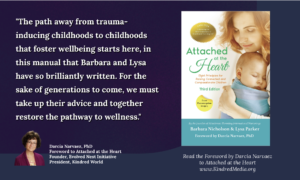
Lisa Reagan: Darcia Narvaez wrote the foreword to your book, Attached at the Heart, and she talks in the foreword about parenting in our “anti-nurturing” culture. You address this in the book and how to respond. How do you recommend we navigate our culture, and normalize nurturing?
00:21:35.640
Lysa Parker: Yeah, it’s one thing, one thing to. you know, to learn about attachment theory. but it’s quite another to to apply it to daily life and even attachment theorists can’t agree, is this is attachment parenting really all that important? Or does it have anything to do with with attachment? Well, of course it does. You can’t, just throw out theories and research, and then not well, how do I deal with this? My baby’s crying and my mother in law is telling me don’t pick up the baby because I’m gonna spoil it. Or my friends are saying, you just need to put your baby in daycare or let them cry it out. They’ll learn how to self soothe.
So, they don’t really understand the cultural milieu out there that is what we called the headwinds of parenting, what they have to navigate through. And it’s really challenging. And then there are thousands of parenting books out there. And you know, people when you have a baby shower give you a book and they say, “Oh, this is the best book I’ve ever read!” And then you learn that it doesn’t agree with your intuition or your heart. or what you knew. And so you throw that out, and you look for the next book.
One thing we found was that so many books are not research informed, but rather based on ideology or parenting myths that are passed down from generation to generation. Those are some of the things that we address in our book. Like, where did “Don’t pick up the baby because you’ll spoil it” come from? Only to find out. It was from John B. Watson, the father of behaviorism, a man who never raised any actual children, but rather just wrote books about his research. He was at Johns Hopkins, and we know now that didn’t work for his family, because his granddaughter, actress Mariette Hartley, wrote a book (Breaking the Silence) about the damage that he has done to society just from that one little adage that he came up with.
It’s crazy how it has become so much a part of the culture that you can ask any middle schooler or high schooler to finish that sentence: Don’t pick up the baby because… and they know it. They just kind of picked it up out of the out of the ether, or they’ve heard it from people and their families. There’s so much that we’re trying to change and to clarify for parents. One of the key points that we’re talking about in the new edition of our book is the Science of Resilience.
00:25:03.650
Barbara Nicholson: You know that this mythology that, if you pick ‘em up, you’ll spoil ‘em, what kind of damage does that do to the brain of a baby who’s crying and crying and not consoled? Well, they’re getting a bath of cortisol, which we know is very damaging to the brain, especially if it’s if it goes on for a long time. And that’s what happens with soldiers that have PTSD. They’ve had so much cortisol in their brain that wires the brain differently. So, you’ve got an infant whose brain is only 25% developed at birth and we’re giving them this toxic overload of cortisol. That to me is what’s so exciting about the research is that it all confirms what our instincts tell us to do.
You know, very few of us can listen to a crying baby. We have to go to other part of the house, put ear plugs in, just deny our own feelings, thinking that this is the right thing to do because of what we’re told by even our pediatricians, who might suggest putting the baby on a rigid schedule. Some books were very adamant about this in the past.
But the American Academy of Pediatrics actually came out and said, this is causing failure to thrive. You have to listen to your baby’s cries, especially knowing that they’re hungry. They have so many needs in those early weeks and months, so, finding the correct sources. Like Lysa was saying, you’re given a parenting book, and you wonder if this is it. You know, my friend loves this book, so must be really great. Well, look at the resources in the back of the book. Look at the child development research that’s incorporated into the book. And if you’re not finding anything but the author’s opinion, then that’s a big red flag.
We were really trying to give each of our eight principals, which are backed up by wonderful science from all over the world.
Attached at the Heart: Seeing and Sensing the Whole Child Through the Lens of Love
00:28:18.930
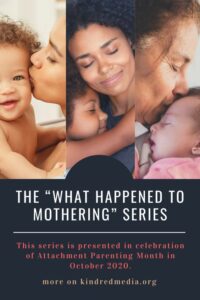
Lisa Reagan: When my son was born, I saw a whole perfect being and I instinctively knew my job was to keep him that way. I knew I had a role in not shutting down my heart to do this. But going out into the world to find support, I realized the world did not see my infant as whole and perfect. And it’s still like that for parents.
As a researcher, Darcia Narvaez has done the transdisciplinary work of pulling together the evolved nest, which is this lens that I saw my child through, to begin with, the lens of love. He’s whole. He’s a whole perfect being. How do I keep him this way? And she has shown that academically. Attachment parenting is the applied evolved nest, Darcia says.
So many parents I see coming on our live calls and in groups for the last 26 years have the same questions I had in the beginning. And they usually quietly whisper… we know what we want to do, follow our instincts and heart, but we’re afraid of the cultural backlash if we say too loudly: we just want to love our child and keep them healthy.
00:30:17.270
Barbara Nicholson: That’s right. Well, I love what you said about focusing on the heart. And we do talk about some techniques that parents can use when they’re having stress from confusion. About, you know, “Well, my mother says this, and my mother-in-law says this, and baby’s having a meltdown, and what do I do to calm myself? That’s the other thing we talk about is that we are the emotional regulator for our baby. So we share a simple practice of heart-focused breathing. We talk about this quite a bit in the book: just breathing, sending your baby love, but you are deeply breathing.
You are getting yourself calm so that you can in a calm way be that emotional regulator for your child. So that’s another huge mythology that’s going along with what Lysa just said: the myths that we’re being handed down from generation to generation don’t have anything to do with science.
00:31:28.500
Lysa Parker: and I love what you said, Lisa about looking at your baby as whole and perfect as they are. We have been indoctrinated to believe that babies are born with sin, or perhaps they have a natural inclination towards evil. So, those are the things that change the lens in which we see our children. But we must look at our babies as a gift, as perfect and whole and good so that we hope and strive to keep their spirit alive, and to keep their natural, their inclinations for goodness and empathy nurtured and cultivated.
00:32:21.370
Barbara Nicholson: And how many times have we heard “the baby’s manipulating you”
like they have an adult brain with this capacity? Behaviorism again, right? Or an inborn need to manipulate others to get their needs met and not think about the adult’s needs – as if they have a capacity to do that. I mean, it’s hilarious when you think about it, but that’s a common thing, you hear.
Is There a Silver-Lining of a Post-Quarantine World?
00:32:56.900
Lisa Reagan: Research shows that’s the authoritarian brain that is starved for nurturing that takes up the protectionist mindset, and then projects all these control issues, “I gotta control this baby.” So, the cycle goes round and round.
I feel like something happened, though, after quarantine. While we were all inside, and a lot of people home with their babies and children for the first time, I started to read these amazing features and mainstream media outlets like the New York Times on motherhood, and telling the truth about motherhood, and how mothers needed to have support, and we don’t have paid leave in this country, and everybody else seems to be able to have that and maternity leave, and we have horrifically high maternal and infant mortality ratea.
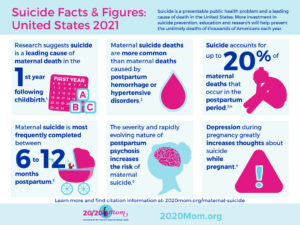 Trigger warning. I’ll just tell our listeners to brace yourself if you haven’t heard this one: The leading cause of death of new mothers in the first year after giving birth is suicide (see the research). Depending upon which study you’re looking at, suicide is one of the leading causes, and for others it is the leading cause. I will put resources underneath wherever you find this interview for that and so you can read more about allo mothers, and how we were never meant to mother/caregiver alone. I also want to offer the resource that we do have a national hotline, dial 988, that anyone can call at any time if they feel like they need help.
Trigger warning. I’ll just tell our listeners to brace yourself if you haven’t heard this one: The leading cause of death of new mothers in the first year after giving birth is suicide (see the research). Depending upon which study you’re looking at, suicide is one of the leading causes, and for others it is the leading cause. I will put resources underneath wherever you find this interview for that and so you can read more about allo mothers, and how we were never meant to mother/caregiver alone. I also want to offer the resource that we do have a national hotline, dial 988, that anyone can call at any time if they feel like they need help.
So, the serious state of motherhood, mothers, and parents in crisis is real. I feel like a tidal shift of parents wanting to work from home and to be home with their children is happening, and many are now realizing what an impossibility that option is in this country.
For parents who are discovering their desire to be with their baby and children, who are feeling the pull of their hearth and instincts to keep their children whole, this book is going to validate them and give guidance on the direction we need to go. Parents have 70 years of science in Attached at the Heart, and then your amazing and beautiful 30 years of wisdom and experience and training and working with parents.
So there, I feel like there’s a little silver lining, because there’s a growing awareness that we can’t go back to pre-quarantine norms. Do you feel like that is happening too?
00:35:53.860
Lysa Parker: Well, there’s certainly interest… more overseas. So there has been in the UN. United States, unfortunately. But, you know, that did make me hopeful that maybe women started to realize how important they were in their child’s life, and then realizing, Hey, how come we don’t have paid maternity leave? Why don’t our government and corporations value us as mothers, and as families? Too many parents have to decide whether to work or be home with their sick child or lose their job if they don’t go to work.
These are just impossible challenges. No wonder our culture is so toxic. Barbara, maybe you want to say something about the Hard Wired to Connect Report.
00:36:57.370
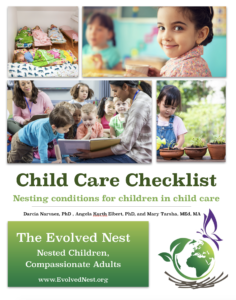
Barbara Nicholson: That report came out what 23 years ago. We went to a conference with these findings, and it was really shocking about the standards of daycare around the country. We’re still are so far from a reasonable caregiver ratio. Still the standard is four babies to one caregiver. Yet if a mother has quadruplets, the whole community comes to her aid. Yet a stranger taking care of four babies, she doesn’t get support. These childcare workers are mostly young women, and a very high turnover.
Often the conversation politically around supporting mothers is giving them free day care versus how much more cost saving would it be and how much better for the mother and baby if her income was supplemented so that she could stay home rather than always finding a solution. That’s outside of that mother baby, you know, relationship. So that’s where I think we really need to get the science behind political movers and shakers that genuinely have an interest in supporting mothers. But don’t really have the science behind them.
So just like anything else, if we want changes in childbirth, if we want changes in policies, it has to come from the grass roots. So, finding new political voices that understand these issues is what really helped change the paradigm. Until then, I think we try to serve our young parents coming to us right now by saying, “Let’s talk about creativity. What are some things that you might be able to do to stay home a little bit longer, or you know, maybe it means moving in with your parents for a while or finding if there’s another single mother to move in with, and you two share.
I love what you said about allomothering. That term, you know, is kind of new to a lot of parents. What is allomothering, alloparenting? Those are the aunties and uncles and grandparents that have been traditionally other caregivers in a baby’s life. Bruce Perry, one of our advisory board members, is an expert in child trauma. and he says it’s only in the last 100 years or so that our paradigm has changed from all babies being born into an environment where there were four adults in their lives, minimum, at least at least four.
So, when we’ve moved out of the village into big cities away from our extended family that really created trauma, not only for the babies, but for the parents. They need the other adults who are invested in their baby as much as they are; so, we have to create it somehow. You have to be very conscious about creating extended family for ourselves.
00:40:34.980

Lisa Reagan: Cathy Myers, who’s been around as long as we have, if not longer, has the Family and Home Network organization. And she is advocating for if we’re going to pay for daycare and childcare, we could just pay parents to stay home with their children or make that possible financially. So, that could be done. It’s done other countries. Here in America I think the average is what? 10 days off that mothers have, and then they go back to work. In other countries they can have as much as 18 months or more. I think one of the people who attend our live calls is in Germany. I think she said they get three years.
00:41:18.960
Barbara Nicholson: I mean, just look at the math. Don’t look at anything else. What would be more cost effective, especially when you have such a high turnover. You’re going to have to pay day care workers a great wage and give them a better ratio of children, and ideally, those caregivers would move up with the children. A lot of them get very bonded to babies up to six months. And then that baby goes to another class. You know, my heart goes out to
care workers who are in that occupation because I love children. But yet it’s devastating for them.
00:42:06.240
Lisa Reagan: Suzanne Zeedyk, an attachment researcher and Kindred board member, talks about children’s experience of the loss of a caregiver or teacher, due to turnover or position changes in daycare, on par with the experience of a death. Because babies and children do become attached to their teachers and caregivers.
00:42:23.740
Lysa Parker: I want to say, this was again late nineties, early, 2,000, the Carnegie Foundation did a study on daycare specifically, and they said 80% of day cares were substandard, and I don’t think that has changed all that much since then.
This is a very complicated issue. It’s more than just paying for daycare. We need high quality daycare or childcare with people who are paid well, who are educated, knowledgeable, committed to being with that child. Because not everyone is going to want to stay home. You’ll have mothers who just maybe didn’t have a nurturing childhood, or maybe they just don’t have it in them to to feel like they’re the best one to nurture, and so there need to be other options.
00:43:38.620
Barbara Nicholson: If, say, a family member is not available to take care of them ideally. The best care would be a nanny, aupair, whatever to come into your home and be become extended family, if a family can afford that, and to stay with that child until they’re off to school. But that is creating an an alloparent situation in your in your home, if possible.
00:44:05.180
Lysa Parker: I think it was Richard Balby, he’s the son of Dr. John Bolby considered the father of attachment peer attachment theory, and he was saying that he wondered if his father’s experience with the nanny wasn’t the reason for, the springboard to his research in attachment. When he was four, back then in England the nannies did all the child care, and he had the same nanny for four years, and then she just abruptly left. and he it really devastated him as a four-year-old. But we see that constant turnover of caregivers all the time. We think, oh, kids are resilient. They’ll get used to it. But it really does damage to their psyche and their emotional health and well-being.
00:44:57.970
Lisa Reagan: One of the nature or nurture books that I remember reading decades ago, had an introduction by the author who said, when her mother saw her becoming too attached to her nanny, she’d just get a new one. It’s right here on my shelf, where I just haven’t put my hands on it in a long time. Maybe there was good stuff in there, but I couldn’t take that thought.
So, this is the third edition. What is it you want people to know about Attached at the Heart that’s new?
Listen to the podcast or watch the video above to find out more about the new features in the book. You can also read the press release here.


